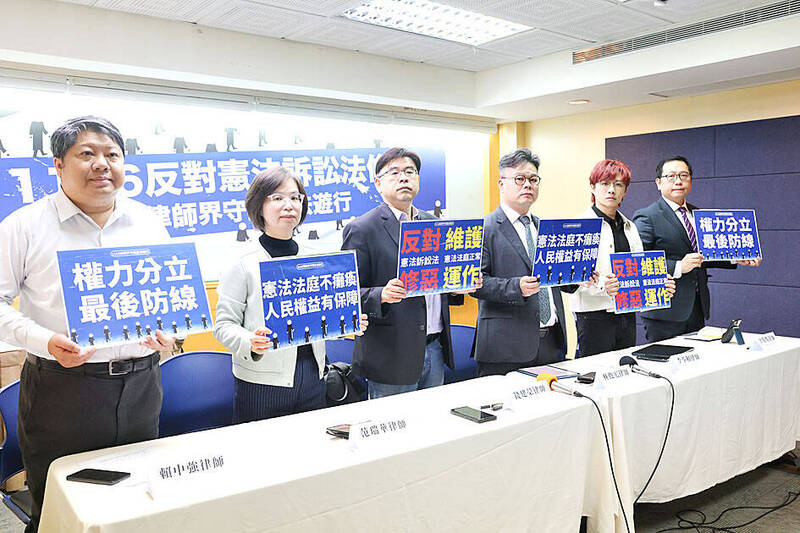《TAIPEI TIMES》 Lawyers to protest over proposed court changes

A group of lawyers attend a news conference in Taipei yesterday. Photo: CNA
By Shelley Shan / Staff reporter
More than 150 lawyers are on Saturday to protest in Taipei against a proposed amendment to the Constitutional Court Procedure Act (憲法訴訟法), which they said could paralyze the court and infringe on people’s constitutional rights.
The amendment, proposed by Chinese Nationalist Party (KMT) Legislator Weng Hsiao-ling (翁曉玲) and which has secured a second reading at the legislature, states the court may not proceed to rulings until at least two-thirds of the 15 grand justices are present.
Any constitutional interpretation can only be valid if it is a collective consensus of at least 10 grand justices, it says.
Currently, the court is able to rule with half of its grand justices present.
The amendment, if passed, would paralyze the Constitutional Court as it currently has only eight grand justices and the legislature is yet to approve the appointments of seven new justices, Cognito Law Office attorney Jacob Lin (林俊宏) said.
Ninety-five percent of the cases handled by the Constitutional Court are related to constitutional rights of civilians, rather than government agencies, he said.
People’s constitutional rights would not be protected if the Constitutional Court grinds to a halt, he said.
Former Supreme Court judge Chien Chien-jung (錢建榮) said he does not object to the proposal that the court can only rule when at least 10 grand justices are present, but other supporting measures must be in place to ensure that the court does not face any disruption.
If the proposed amendment is approved at the legislature, the court can never function with only eight grand justices on the bench, he said.
The Constitutional Court reviewed very few cases in the Martial Law era and during the administration of former president Ma Ying-jeou (馬英九), Chien said.
During the Martial Law era the presence of three-quarters of grand justices was required, while during Ma’s term the requirement was two-thirds of them.
Due to the two-thirds rule, the court reviewed fewer than 10 cases per year during Ma’s time in office, Chien said.
The court eventually had to turn down review of some cases, because the rule prevented the court from reaching verdicts, he said.
The court was able to review cases faster only after a rule change in 2022 that required only half of the grand justices to be present, he said.
It reviewed 20 cases in 2022 and another 20 last year, he added.
Lawmakers should not ask the Constitutional Court to do what they cannot do, he said.
“None of the laws would have passed if it required a two-thirds majority at the legislature,” he said. “Imposing such a rule on the Constitutional Court would cause the nation to return to the Martial Law era and bring the court to a halt.”
Attorney Hong Wei-sheng (洪偉勝), who represented the Presidential Office at the Constitutional Court’s review of amendments to the Act Governing the Legislative Yuan’s Power (立法院職權行使法), said the proposed amendment reflects one-way thinking and a lack of thorough deliberation among KMT lawmakers.
Weng said she respected the input from 153 lawyers on her proposed amendment, but they represent only a small portion of 20,000 lawyers across the nation.
新聞來源:TAIPEI TIMES




















